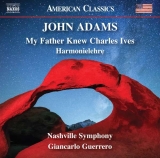 John Adams: My Father Knew Charles Ives + Harmonielehre; Nashville Symphony, Giancarlo Guerrero; 1 CD Naxos 8.559854; Aufnahmen 2018/2019, Veröffentlichung 01/2021 (69'03) – Rezension Remy Franck
John Adams: My Father Knew Charles Ives + Harmonielehre; Nashville Symphony, Giancarlo Guerrero; 1 CD Naxos 8.559854; Aufnahmen 2018/2019, Veröffentlichung 01/2021 (69'03) – Rezension Remy Franck

John Adams hat My Father Knew Charles Ives im Jahre 2003 für das San Francisco Symphony komponiert, das es unter Michael Tilson uraufgeführt hat. Die Hommage an Charles Ives ehrt auch Adams’ Vater: « Mein Vater fühlte sich wie Ives von der kontemplativen Philosophie der Neuengland-Trancendentalisten angezogen, insbesondere von Thoreau, dessen Bescheidenheit, Sparsamkeit und grimmige Unabhängigkeit er bewunderte, auch wenn er sie nicht immer nachahmen konnte. » Das Werk hat drei Sätze, Concord, The Lake und The Mountain. Man hat das Stück ‘Musikalische Memoiren’ genannt, die ebenso humor- wie poesievoll an Adams Kindheit erinnern und Klänge aus seiner Kindheit in Musik gießen, so wie es auch Charles Ives, u.a in Three Pieces in New England, gemacht hat. Dem Orchester aus Nashville gelingt unter Giancarlo Guerrero eine Interpretation, die mit viel Klarheit und orchestralem Raffinement besticht.
Das über 40 Minuten dauernde Stück Harmonielehre von 1985 ist im Gegensatz zu My father Knew Charles Ives ein minimalistisches Werk von John Adams. Der erste Satz hat keinen Titel. Man könnte ihn ‘Kräfte’ nennen, denn treibende minimalistische Motive treiben das Stück voran bis zum Klimax, wo sich die Musik brodelnd entlädt, um dann weiter zu treiben. Der zweite, langsame Satz heißt The Amfortas Wound und staut Energie in ruhigen Klangflächen, aus denen sich zwei Höhepunkte entladen. Meister Eckhardt and Quackie lautet der Titel des 3. Satzes und er kommt, wie Adams sagt, aus einem Traum, in dem seine kleine Tochter Quackie eine Rolle spielt. Was da genau zwischen dem Mädchen und dem deutschen Mystiker geschehen sein soll, ist aus der hitzig pulsierenden Musik nicht abzuleiten.
Obwohl das Nashville Symphony auch von diesem Werk eine gute Interpretation vorlegt, ziehe ich die etwas spontanere mit den Berliner Philharmonikern vor, die das Stück unter der Leitung des Komponisten aufgenommen haben. Dennoch ist die Aufnahme aus Nashville ganz beachtlich, nicht zuletzt wegen der Spannung, die Guerrero darin erzielt.
John Adams composed My Father Knew Charles Ives in 2003 for the San Francisco Symphony, which premiered it under Michael Tilson. The tribute to Charles Ives also honors Adams’ father: « My father, like Ives, was drawn to the contemplative philosophy of the New England trancendentalists, particularly Thoreau, whose modesty, economy and fierce independence he admired, even when he could not always emulate it. » The work has 3 movements, Concord, The Lake and The Mountain. The piece has been called a ‘Musical Memoir,’ recalling Adam’s childhood in a way that is as humorous as it is poetic, casting sounds from his childhood in music, much as Charles Ives did in Three Pieces in New England. The Nashville orchestra, under Giancarlo Guerrero, succeeds in an interpretation that captivates with much clarity and refinement.
Unlike My father Knew Charles Ives, the 1985 piece Harmonielehre, which lasts more than 40 minutes, is a minimalist work by John Adams. The first movement has no title. It could be called ‘Forces,’ as driving minimalist motifs propel the piece forward to its climax, where the music seethes, then drifts on. The second, slow movement is called The Amfortas Wound and accumulates energy in quiet soundscapes from which two climaxes are discharged. Meister Eckhardt and Quackie is the title of the 3rd movement, and it comes, as Adams says, from a dream involving his young daughter Quackie. Exactly what is supposed to have happened there between the girl and the German mystic cannot be deduced from the heatedly pulsating music.
Although the Nashville Symphony presents a fine interpretation of this work as well, I prefer the more spontaneous one with the Berlin Philharmonic, who recorded the piece under the composer’s direction. Still, the Nashville recording is quite remarkable, not least for the tension Guerrero achieves in it.






















